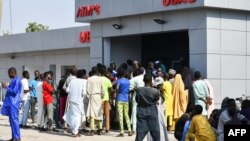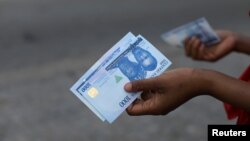Nigeria's government is challenging a Supreme Court order that suspended Friday's deadline for the phaseout of old currency notes, saying it lacks jurisdiction. The issue of when the old currency becomes invalid has turned into a significant issue as Nigeria prepares for elections a little more than two weeks away.
On Wednesday, a seven-member panel of the Supreme Court ruled in favor of a lawsuit filed by three Nigerian state governors to stop the central bank from phasing out the old notes by this Friday, February 10.
Nigeria's attorney general, Abubakar Malami, challenged the Supreme Court's ruling in a countersuit filed by his legal team late Wednesday and called for the ruling to be dismissed.
Malami argues the power to rule on the suit is within the jurisdiction of the Federal High Court, not the Supreme Court.
Hours to the deadline, anxiety is growing among citizens over the uncertainty.
Martin Obono, a lawyer and team lead at TAP initiative, a nonprofit that promotes government accountability and transparency, is concerned about the uncertainty of the situation.
"Following the government's antecedents in terms of not respecting court judgment and court orders, I am not sure the federal government is going to obey whatever the Supreme Court has said, especially in an instance where it has a lot of political undertones,” he said. “That obviously is going to have an effect on what Nigerian people should do or expect.
Obono said he encourages Nigerians to go to the bank and change their currency.
“This is a judgment that you can't trust,” he said.
The governors behind the lawsuit, from Kaduna, Kogi and Zamfara states, say the country needs more time to transition to new 200-, 500- and 1000-naira notes introduced in December. They point out that a cash shortage is leading to attacks on banks.
Critics say the governors and other politicians who support the Supreme Court are doing so in order to enable vote-buying with the old currency ahead of the February 25 polls.
But Olumuyiwa Onlede, executive secretary of the Citizens Awareness Against Corruption Initiative, said even though politicians may be acting for selfish reasons, ordinary Nigerians are also affected by the impending deadline.
"This policy is a very good policy but what I think the attorney general is not looking at is the resultant effect of this policy and the implementation on the masses,” Onlede said. “So many banks are under lock and key, they're afraid of being attacked."
For weeks, millions of Nigerian citizens have been lining up at banks to get the new notes. In some instances, tempers run high leading to protests and attacks on banks.
Abuja resident Nelly Nwora wants authorities to obey the Supreme Court’s ruling and extend the deadline.
"It is difficult accessing cash, you have needs and you can't meet your needs, not because you do not have money but because you really can't access cash,” Nwora said. “You go to the ATM machines and you see long queues, your mind will skip. It has not really been easy and we're hoping that this is resolved as soon as possible."
Authorities say the new currency is paying off in fighting crime and counterfeiting, and reducing excess cash in circulation.
This week, the International Monetary Fund urged Nigerian authorities to extend the currency swap deadline.





